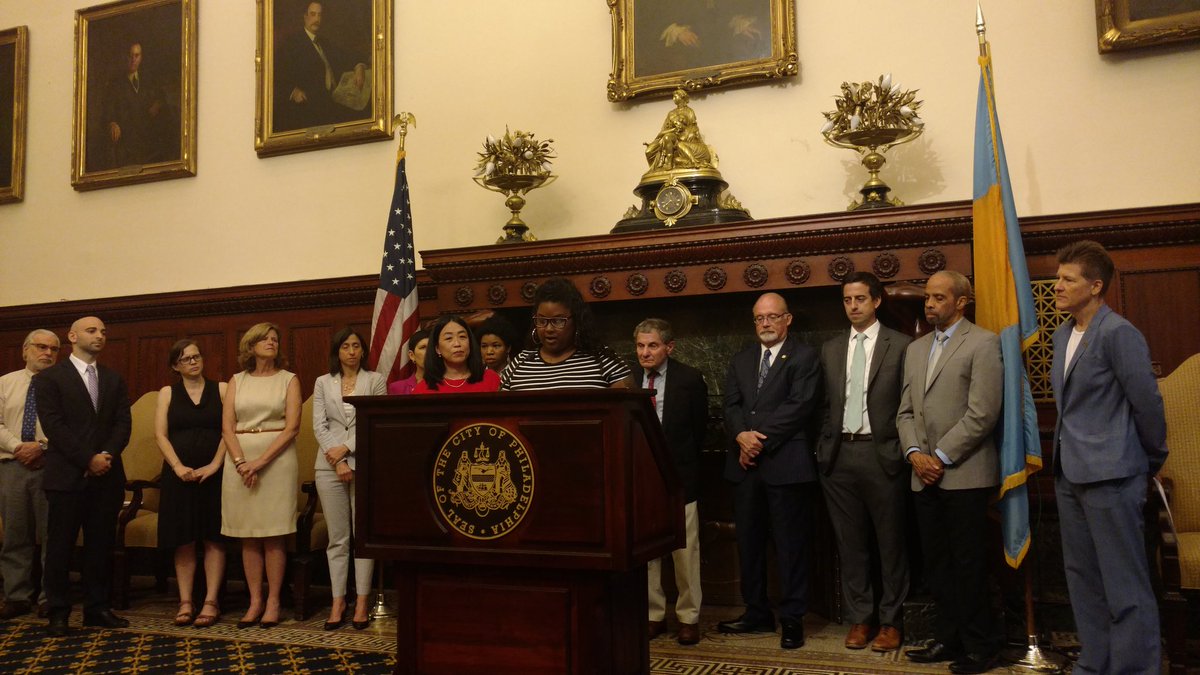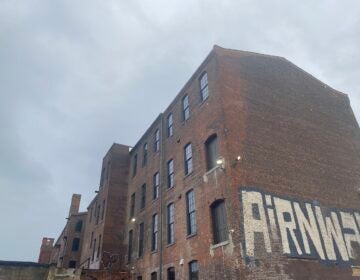Philadelphia sets aside $500,000 to help renters fight eviction

Standing beneath dozens of portraits of Philadelphia mayors in City Hall’s reception room, Yazmin Vasquez told the assembled crowd what it’s like to sleep in a house without a functioning heater.
She hadn’t noticed the missing source of warmth until her family first moved in. But the situation quickly became wretchedly clear. Instead of fixing the issue, Vasquez’s landlord brought them a space heater and the whole family slept in one room, gathered around its paltry glow.
Eventually, such indignities became too much, and Vasquez began withholding rent to force repairs.
The landlord responded quickly; he took her to eviction court.
That’s where Vasquez’s story differs from most low-income renters. She was able to get an attorney. When her landlord discovered she had legal assistance, he claimed a family emergency and said he needed to leave court. He then dropped the case. Whereas most landlords have lawyers, over 90 percent of renters go unrepresented
Back in March Vasquez told her story at a City Council hearing on eviction and substandard housing in poor neighborhoods, organized by council members Helen Gym (D-At Large) and Maria Quiñones-Sanchez (D-7th District). After the hearing, they managed to add $500,000 for anti-eviction measures to the city budget.
Now, a week after council began its summer recess, Gym wanted to highlight the victory in the relative quiet before July 4th weekend.
“We are paying attention to this issue and we are taking action,” said Gym in an interview with PlanPhilly.
It is as yet unclear how, exactly, the $500,000 will be spent. Gym says the managing director’s office will put out an RFP this summer to solicit bids for services to help renters in court.
Representatives from Community Legal Services (CLS), which provides civil legal assistance to low-income Philadelphians, said they hope to apply for some of the funding to hire more lawyers to provide aid in eviction court.
“However the money is distributed, there will be more legal-aid lawyers on hand to help tenants,” said Rasheedah Phillips, managing attorney at CLS and one of the handful of tenant-side lawyers who currently work in landlord-tenant court. “I would also like to figure what can be done with the mediation program. We need to ensure people who go through the mediation process have equal access to legal information and their rights because often they are railroaded.”
As landlord-tenant court currently operates, many unassisted renters reach agreements with their landlord in the mediation room before their cases reach the judge. Often, those terms are bad for renters.
Some or all of the $500,000 could also go towards for the Landlord-Tenant Legal Help Center that currently exists in the court and is meant to ensure renters know their rights. Created in 2012, and staffed by pro bono lawyers and paralegals, the Help Center has never enjoyed stable funding. As a result, it isn’t open all the hours that court is in session.
“Tenants arrive in that court for eviction hearings and don’t know what to do,” says Joseph Sullivan, director of pro bono programs at the law firm Pepper Hamilton LLP. “They can go to the Help [Center], explain what their situation is, and what they need to be able to talk about when they go in front of the judge. They need to be able to explain their position and how they got into the predicament they are in, and why they believe that the landlord’s effort to evict them is wrong and contrary to law.”
A variety of bureaucratic tweaks were discussed Thursday afternoon as well. These include the possibility of increased inspections of rental properties; an updated licensing process, which would allow the city to more easily crackdown on slumlords; and finding a way to keep evictions off of tenants’ permanent legal records, which would be similar to a law recently passed in Washington State .
The $500,000 funding increase is part of a larger, national effort to fight evictions unfolding in cities across the country. Baltimore is considering smaller scale policies similar to Philadelphia, while in New York City Mayor Bill DeBlasio secured a huge funding increase to provide counsel for any renter under 200 percent of the poverty line. The price tag in NYC? A staggering $155 million annually phased in over a five year period.
No one expects Philadelphia to come up with anything like that kind of money. The city’s director of planning and development, Anne Fadullon, noted that, even with the new money, Philadelphia wouldn’t come close to solving its eviction crisis. Philadelphia’s Affirmatively Furthering Fair Housing study last year revealed that one in seven renter households faced an eviction filing in 2014-2015. That’s about 41,000 households.
“Although we realize this isn’t going to solve the problem, it’s a big step in the right direction and we should really celebrate that,” said Fadullon. “We don’t celebrate this kind of thing enough because we get bogged down in all the negatives. But this is a really great thing.”
WHYY is your source for fact-based, in-depth journalism and information. As a nonprofit organization, we rely on financial support from readers like you. Please give today.






